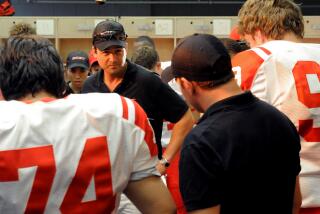Happiest Medium for Writers? TV
There’s an old saying in Hollywood: The screenwriter is the last to know and the first to go. Writers are so interchangeable that 17 of them were put to work on the movie “Charlie’s Angels.” But in TV, the writer is king. Just ask Steven Bochco, David E. Kelley, Aaron Sorkin and John Wells, who’ve become brand names creating hit shows that reflect every nuance of their writing styles and sensibilities.
Until this TV season, screenwriter David Hollander had the dubious distinction of being a hot Hollywood writer without any of his scripts having made it to a movie theater. So Hollander moved over to TV, creating “The Guardian,” the CBS show that has emerged as the top-rated new drama of the fall season. Airing Tuesdays at 9 p.m., the series is about a sleek corporate lawyer required to do community service in child advocacy after having been arrested on drug possession charges.
Frustrated by the glacial pace of film script development, Hollander got together with producer Mark Johnson and pitched his idea for “The Guardian” to CBS last year. He wrote the pilot last fall and shot it in March. By September, it was on the air. “It’s been a great experience,” says the balding 33-year-old writer, sitting in an office on the Sony lot decorated with photos of his family and vintage baseball cards of his hometown Pittsburgh Pirates heroes.
“In film, you have to get the stamp of approval from everyone: the director, the producer, the studio and the star. In TV, I’m the arbiter. Everything that goes here has to go through me.”
For years, if writers made it in Hollywood, they abandoned TV without a backward glance. Feature films had a prestige--and a payday--that TV lacked unless you were lucky enough to create a long-running hit. But the tide has shifted as writers have sought more control over their work. In recent years, gifted writers have migrated to the small screen, depressed by an increasingly corporatized movie industry dominated by mindless teen comedies and action-adventure films.
Alan Ball could’ve written for anyone in Hollywood after “American Beauty,” but he went back to TV instead, creating “Six Feet Under” for HBO. J.J. Abrams has nearly a dozen unproduced screenplays in his files (along with such films as “Regarding Henry” and “Gone Fishin”’), but he’s two for two in TV, having created both “Felicity” and the new ABC hit “Alias.” The WB’s “Smallville” creators Miles Millar and Alfred Gough come from film, having written the Jackie Chan action comedy “Shanghai Noon.”
Michael Frost Beckner, an executive producer on the CIA drama “The Agency,” has toiled for years in Hollywood, writing such films as “Sniper” and the upcoming “Spy Game.” Shane Salerno, creator of “UC: Undercover,” has worked on such films as “Armageddon” and “Shaft.” Terry George, creator of CBS’ “The District,” spent years writing such films as “In the Name of the Father” and “The Boxer.”
Joss Whedon, creator of the long-running hit “Buffy the Vampire Slayer,” was a Hollywood script doctor who says he had “almost nothing but bad experiences” working on a host of action movies, including “Speed,” “Twister” and “Waterworld.” After “Buffy” became a hit, he returned to film, writing a draft of “X Men.” Nothing had changed.
“The studio actually invited me to a read-through, despite having thrown out my entire draft without telling me,” he said in a recent interview. “I was like, ‘Oh, that’s right! This is the movies!’ People ask, ‘What’s the worst job you ever had?’ I tell them, ‘I once was a writer in Hollywood.”’
Hollander had an equally frustrating experience: Hollywood tried, as Pauline Kael once wrote, to kill him with encouragement, talking him up as a great talent but never making his movies. “Becoming Alfred,” a script he wrote for Scott Rudin, is on everyone’s list of favorite screenplays, but it’s never been made. Hollander wrote 15 scripts in six years, many bought by such A-list filmmakers and stars as Rudin, Robert Zemeckis, Dustin Hoffman and Jim Sheridan. The only one that got made was “Rated X,” a Mitchell Brothers biopic that didn’t get a theatrical release.
Hollander especially relishes TV’s immediacy. Having read about a rash of hate crimes against Arab Americans in the aftermath of the Sept. 11 terrorist attacks, Hollander wrote a “Guardian” episode about a Muslim restaurant owner who is sued for beating up an intruder he finds vandalizing his restaurant. The vandal turns out to be a teenage boy, though his motive isn’t what it initially appears to be. The show, which films this week, will be on the air in December.
“It’s great to be able to write something that comes directly out of the world we live in,” Hollander says. “In features, you can’t write about what’s happening in your life this week. But in TV, if something happens today, I can be writing about it tomorrow. It makes you feel a lot more like a painter who wakes up in the morning and can put something on a canvas right away.”
TV’s biggest appeal for writers involves control. In film, once shooting begins, the writer is basically superfluous; he or she is lucky to be invited to the set, much less to the premiere. The writer is there to be replaced and rewritten. Les Bohem, who’s created “Taken,” an upcoming mini-series produced by Steven Spielberg for the Sci-Fi Channel, says, “I have sole screen credit on [the film] ‘Daylight,’ and there’s literally one line from my script in the movie.”
John Ridley, a producer on the NBC series “Third Watch,” says that after working in TV, “I look at writing studio movies the way I look at shining shoes.” He once found himself working on a film for which there were 12 people in a room, all giving him notes. “You get notes from the producers and the actors and the actors’ fitness trainers,” says Ridley, who wrote the original script for “Three Kings.”
“In TV, the writer is in charge, so you have a singularity of vision, which is why you can see hours and hours of great TV but maybe only two or three great films each year.”
Film is a director’s medium. On most TV shows, each episode has a new director; it’s the writing staff that remains constant. “It’s a writer’s medium because it’s driven by ideas and material, not movie stars,” says Abrams. “The writer determines everything from what the characters say to what they’re wearing when they say it.”
*
It’s no coincidence that most of the writers who’ve migrated to TV specialize in adult-oriented dramas, a genre nearly extinct in Hollywood except for a handful of star-driven vehicles released during Oscar season.
Most studio movies have little room for personal stories or ambiguous characters. Hollander says that if he’d written “The Guardian” as a film, “it would’ve demanded that something huge happen, where a lawyer would represent a kid who wanted to break the back of a corporate empire. Movies are about acute situations. In TV, you can write about chronic problems, like a son’s relationship with his father.”
Much of the difference is physical: The big screen lends itself to spectacle; the small screen is better suited to intimate drama. “It’s nice to be able to write for people sitting in their living room, where you don’t have to create a star-driven event for them,” says Hollander. “Hollywood movies are now the stuff of the gods. They want to film the Super Bowl, where one team is good guys and the other is bad guys and ultimately the good guys prevail. In TV, writers can say, ‘We know all about the Super Bowl. I’m more interested in the guy on the bench and his problems.”’
Not everyone in TV is welcoming this influx of young film writers: Their presence has made life that much difficult for established TV writers, who complain that many network executives prefer hearing pitches from disgruntled Hollywood types to entertaining the ideas of seasoned TV pros. Even Hollander doesn’t romanticize his new medium. TV remains as much a bottom-line business as film. Hollander has to pitch every script idea to CBS, which also has approval over most casting decisions: The show’s star, Simon Baker, was network chief Les Moonves’ personal choice.
As the show’s ratings have gotten stronger, Hollander has earned more freedom, but if they plummet, he knows he will lose much of his independence. For now, he’s spending every waking moment on the show, putting in an 80-hour week. “My wife and kids wave goodbye to me Monday morning, knowing they won’t really see me again until Saturday.”
He’s not complaining. “As a screenwriter, I was always compromising. I would build a house, but I couldn’t stop someone from putting a plush pink carpet in the kitchen. In TV, the story comes first, and if you’re a writer, that’s all you can ask for.”
*
“The Big Picture” runs each Tuesday in Calendar. If you have questions, ideas or criticism, e-mail them to patrick.goldstein@latimes.com.
More to Read
The complete guide to home viewing
Get Screen Gab for everything about the TV shows and streaming movies everyone’s talking about.
You may occasionally receive promotional content from the Los Angeles Times.






